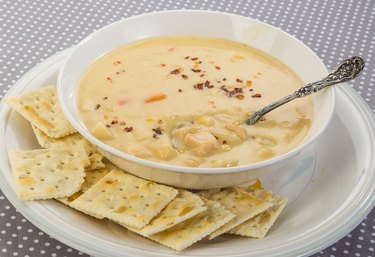
Although crackers may sound like a healthy snack option, you must choose the right varieties to keep your snack low in fat and calories. Also, you must control your portion sizes to avoid possible health complications such as weight gain, high blood pressure and water retention. Read food labels to determine serving sizes and nutritional values for the crackers.
Size
Video of the Day
Eating too many crackers can cause you to gain weight. Serving sizes for crackers are relatively small, and if you do not control your portions, you'll consume more calories and fat. According to the My Pyramid website, five whole wheat crackers are equivalent to one serving of whole grains. Eating seven saltine crackers is equivalent to one serving of refined grains.
Video of the Day
Types
Choosing the right type of cracker can help ward off weight gain by reducing your calorie and fat intake. For instance, one cup of regular snack crackers contains 13 g of fat and 262 calories, according to the United States Department of Agriculture. However, one serving of low-fat, whole-grain crackers contains approximately 2 g of fat and 121 calories per serving.
Effects
Crackers, especially salted varieties, contain high amounts of sodium. Too much sodium in your diet can cause an increase in your blood pressure. According to registered dietician Karmeen Kulkarni, a single serving of crackers typically contains around 200 mg of sodium. If you are eating too many crackers or eating high-sodium spreads with the crackers, you may be consuming more sodium than your body needs.
Considerations
Eating too many high-sodium crackers can also cause you to retain water. You may notice swelling in your hands and feet when you are eating a diet high in salt. Choose low-sodium versions or unsalted crackers to reduce water retention and high blood pressure symptoms. According to the United States Department of Agriculture, one cup of low-salt snack crackers has approximately 134 mg of sodium.